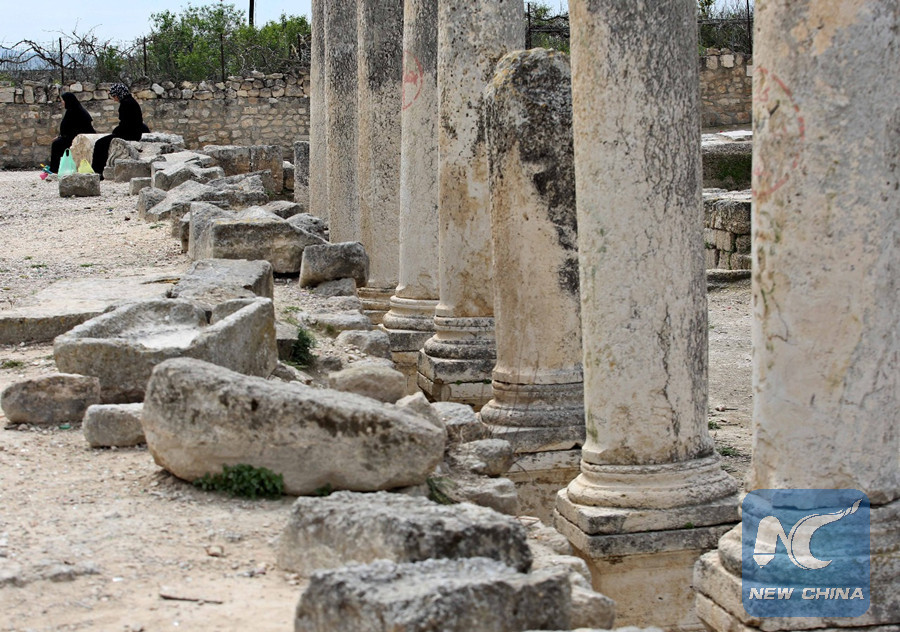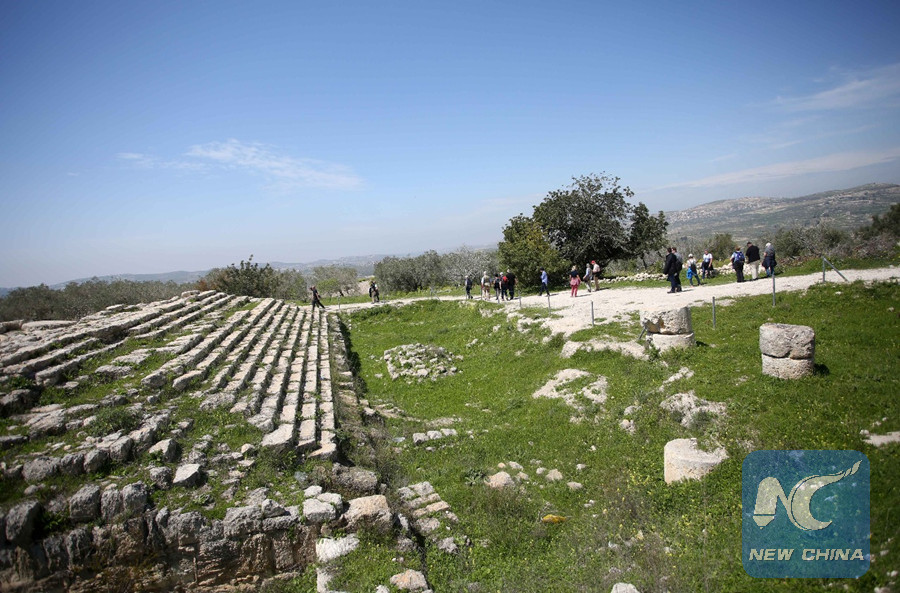
Palestinian women seen during their visit to the Roman historical site of Sebastia village, north of the West Bank city of Nablus, on March 22, 2017. (Xinhua photo)
NABLUS, West Bank, April 4 (Xinhua) -- A heated cultural conflict between Palestinians and Israelis is raging on, with an archaeological town near the West Bank city of Nablus as the battlefield.
Sebastia, a small historical town located on a hill with panoramic views across the West Bank, accommodates ancient Roman and Hellenistic antiquities.
The town embraces Roman churches, temples and tombs as well as a Roman amphitheater and an artistic theater where the celebrations used to be held.
Christians and Muslims believe that St. John the Baptist is buried here.

Palestinians seen during their visit to the Roman historical site of Sebastia village, north of the West Bank city of Nablus, on March 22, 2017. (Xnihua photo)
Palestinians accuse the Israeli authorities and settlers of trying to destroy historic monuments in the town and falsify its history, which has a glorious civilization spanning more than 3,000 years.
"The Israeli authorities and settlers are launching continuous attacks against the archaeological area of about 2,000 dunums," Mayor of Sebastia Mohammad Azem told Xinhua.
He explained that these acts included preventing the restoration work as well as prohibiting providing tourist services to visitors from around the world.
Palestinians complain that settlers have repeatedly attacked the town and fenced parts of its antiquities area where they hold Jewish religious rituals.
Last week, the Israeli army removed road directive signs placed by the Municipal Council in Sebastia to facilitate tourists.
"The Israeli authorities threatened to remove these signs if they do not include directions in Hebrew," the mayor revealed.
He accused Israel of attempting to illegally seize the town by pressuring the Palestinian population to displace them.
Twelve dunums of the archaeological area is located within (B) areas, which are controlled by Israeli military and Palestinian administrative authority, while the other part of the area lies within (C) areas, which falls under complete Israeli administrative and military control.
Owners of restaurants and hotels complain about the Israeli acts in the town which have caused them severe damages and losses.
"We suffer daily from the settlers who attack our shops... The Israeli army also prevents tourist buses from reaching our area," Nael Aqel, owner of a tourist restaurant in the town, told Xinhua.
The man said the Israeli attacks included gunfire, which scares tourists who in the end decide not to visit a place plagued with clashes and trouble.
"This has led to grave losses," he added.
Aqel pointed out that the Israeli army demolished his restaurant "under the pretext" of not obtaining legal construction permits.
"My restaurant is built on my own private land," he stressed.
Murad al-Sudani, Secretary-general of the National Palestinian Commission for Education, Culture and Science, said the repeated attacks by Israel and its settlers on the historical town of Sebastia are an attempt to seize the town and "steal its history to serve the Jewish narrative."
"Israel targets all Palestinian heritage and history... We have previously documented Israel's theft of antiquities from Sebastia and other historical sites in Palestine," he added.
Sudani referred to Palestinian efforts and contacts with the United Nations Educational, Scientific and Cultural Organization (UNESCO) and relevant institutions to preserve and internationalize the Palestinian heritage and stop Israeli attacks.

